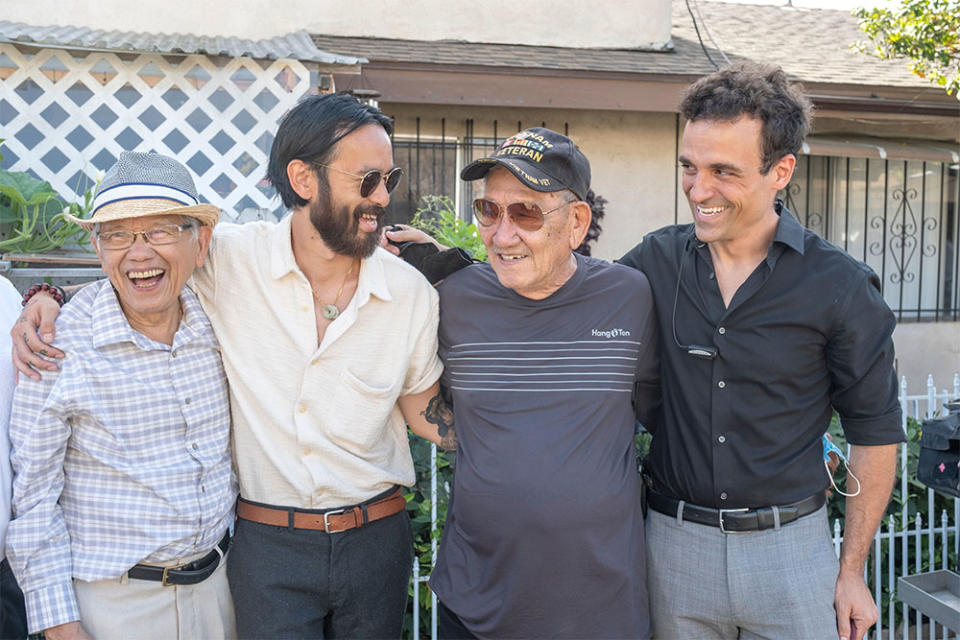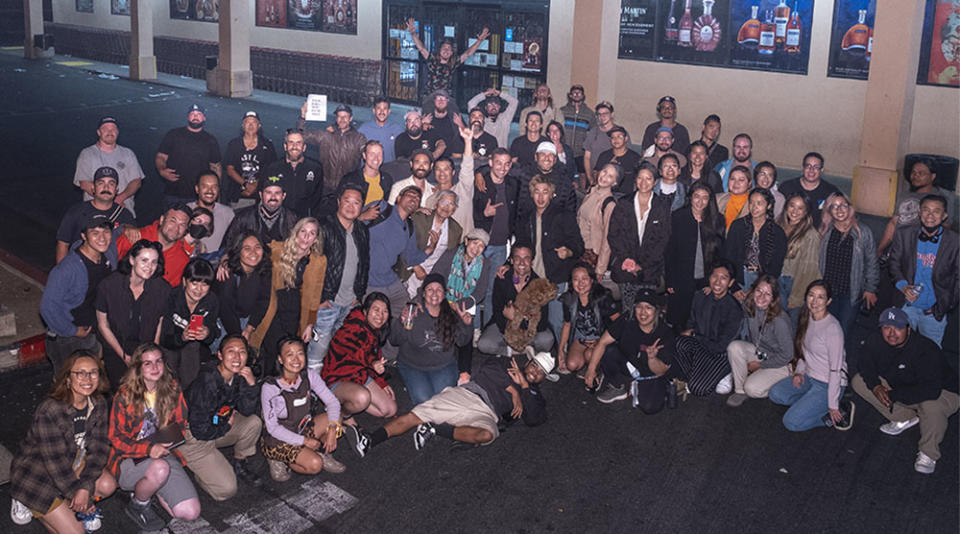Sundance: How the Multicultural Team Behind ‘The Accidental Getaway Driver’ Sought to Make a Culturally Sensitive Film

Andy Sorgie knew he had finally found his passion project when he read Paul Kix’s 2017 GQ feature “The Accidental Get Away Driver,” the true story of Long Ma, an elderly driver-for-hire in Orange County whose life was unexpectedly upended one night when his passengers turned out to be convicts on the run from a recent prison escape. What sounds like a crime thriller is actually a surprising tale of lonely men marginalized by society and their own choices, and the ability to find redemption and chosen family in the most unlikely of places.
“It’s about a group of people that you don’t really see shown in media too often,” says Sorgie, vice president of film at Kimberly Steward’s K Period Media. “I was always looking at it like, ‘How do we tell [Ma’s] story and make sure that he has a voice in it?’ He’s not somebody you pay off and then don’t include.”
More from The Hollywood Reporter
Octagon Promotes Stephen Macias to Lead Diversity Across Marketing Agency Network (Exclusive)
Randall Park Sundance Feature 'Shortcomings' Lands at Sony Pictures Classics
Men Out-Talk Women Almost Three to One in the Movies, Study Finds
And importantly, Sorgie — whose film, The Accidental Getaway Driver, premieres in the U.S. dramatic competition at Sundance on Monday and represents his debut as a lead producer after a decade learning the ropes — knew that, particularly as an outsider to the Vietnamese immigrant community in which the narrative is set, the film had to achieve a critical balance. It had to tell a story that was universally resonant without compromising the authenticity of the specific culture it was portraying, and vice versa. “How do you do everything you can to make [the movie] in the right way, and it’s also good?”
Even though he was told by multiple people that he didn’t need to option any rights because the story was a matter of court record, Sorgie not only reached out to Thunder Road Pictures, which already had a handshake agreement with Kix to adapt his GQ article, to team up on the movie, but he also was determined to secure Ma’s life rights — and his blessing.
That kicked off a six-month odyssey in itself because for a third-generation Italian American first-time lead producer, tracking down a septuagenarian Vietnamese immigrant loner who spoke no English was no easy feat. Sorgie was referred to cultural consultant Jes Vũ, who introduced him to Joseph Hieu, who for decades had been playing bit parts whenever Hollywood needed a Vietnamese side character. “I would have been a white dude lost in Little Saigon [without them],” says Sorgie of the insular southern California enclave that is home to the world’s largest Vietnamese population outside Vietnam.
Sorgie had gotten a hold of a lawyer who previously represented Ma, but the latter had soured on too many would-be deals for projects that always fell through and was hard to reach. So Hieu went to work on his local connections: “I asked all the old South Vietnamese soldiers, ‘Hey, have you heard of this name? He used to be a captain [in the South Vietnam army].’” A shopkeeper recognized Ma and directed Hieu to the room the old man was renting in Garden Grove, where he was eventually persuaded to meet with Sorgie and hear his pitch in person.
Sitting down at Little Saigon café Chez Rose, Sorgie (with Hieu as interpreter) shared the personal connection he felt with Ma, as his own father had earned two Purple Hearts fighting alongside the South Vietnamese forces during the war. “Long was still ‘maybe yes, maybe no,’” Sorgie says. Then the producer’s dad sent over a package in the mail: a South Vietnam flag from 1968 that he had carried throughout the war. Sorgie gifted the flag to Ma, along with a personal note from his father, and from there “he saw that we were coming it from a very genuine place,” he says, adding that he pushed to make sure that Ma received a fair payment for his life story. “It was very important to have his deal be commensurate to Paul Kix’s, the white writer who wrote the article.” The real Ma even has a cameo in the film, playing Chinese chess opposite the actor who plays him (France-based Hiệp Trần Nghĩa, whom Vũ had spotted in a short at the Viet Film Fest in 2021).

While Sorgie and Hieu were working to get Ma on board, director Sing J. Lee and co-writer Christopher Chen honed the script. Both men are of Asian but not Vietnamese descent. (Sorgie explains that although he had to consider logistics and the practicalities of making a financeable film when assembling his multicultural crew, many of whom are Asian American, in multiple cases the “best person for the job” was Vietnamese, such as costume designer Kim H. Ngo as well as Julian Saporiti, who wrote original songs for the film). Lee says he was inspired by his grandmother, who was dying while he and Chen were writing the screenplay in 2021. “I felt the fragility of all these stories that I was never able to communicate with her on [because of a language barrier] that would pass with her and no longer exist,” he says. “Because as with any marginalized community, our stories aren’t always recorded, and they’re so oral. It made me think a lot about somebody like Long Ma. You have this exterior of a stoic, old man who rarely speaks for many reasons, but what’s beneath that?”
The director, who had spent much time researching narratives about the Vietnamese American experience in Southern California, was also determined to avoid stereotypes of Vietnamese gang culture as well as incarcerated people. So, he turned to books including The Gangster We Are All Looking For by Lê Thị Diễm Thúy, Nothing Ever Dies by Viet Thanh Nguyen, The Best We Could Do by Thi Bui and The Dream Shattered by Patrick Du Phuoc Long. “The personal history of many immigrant and refugee communities aren’t as prevalent as they should be, or are written from the lens of someone on the outside looking in,” he says, “so I turned to a lot of Vietnamese American literature.”
For her part, Vũ — whom Sorgie calls “probably my best hire on the movie” — contributed a key note early during the draft process. “Vietnamese people are always identified by the Vietnam War, especially in media,” she told him. Sorgie says, “That is a cultural note that went into the script and made the movie better and subtler. Sing is the lead creative champion of this movie, but as I was going through the process I was starting to understand where, when you’re looking at a note, is this a note that’s specific to something cultural or a creative note? As a producer, I was trying to mix those things together.”
Sorgie also made the meaningful decision as a producer not to keep his cultural advisors in the “consultant trap,” a position that often befalls experts from a specific (usually marginalized) background and makes it hard for them to build their own careers in the industry. By the time the film was completed, Vũ was given a co-producer credit and Hieu was promoted from interpreter to producer. (Sorgie also made Lee’s assistant, Quyên Nguyen-Le, an associate producer alongside Vietnam-born Linh Nguyen.) “I never thought they’d have the good heart to give me the producer credit,” says Hieu. “It’s an honor to do something not only for myself but for the community.”
To be true to the story, the majority of The Accidental Getaway Driver’s dialogue is in Vietnamese — something Sorgie wasn’t concerned about after seeing the success of other American films like The Farewell and Minari. Hieu, as well as academic Ly Thuý Nguyễn (another referral from Vũ), each combed through the screenplay to translate the dialogue into Vietnamese with nuanced attention to each character who would be speaking the lines: Long Ma, the elderly South Vietnamese soldier stuck in his old ways; Eddie, the young convict mostly assimilated into western culture; and Tây, the 40-something convict who not only becomes the group’s literal translator but its figurative mediator as well. “We were really specific about the slang they might use, the syntax of everything,” says Lee, who also worked closely with the cast to find the precise language that would ring true. “We set aside sessions where myself and Ly and [the actors] would chat about any line that felt like there was a more generational or colloquial way the character would naturally say it, without losing the intention. There was such a fluidity to the translation process.”
That consideration impressed Dustin Nguyen (21 Jump Street, Warrior), who plays Tây and was the biggest name on the production. “It takes so much work to get the dialogue and authenticity right, and a lot of times other projects won’t have the support team, the right consultants or the time it takes to get it right. You have to respect the director’s and producer’s vision, and it’s quite tedious to explain the cultural and lingual nuances,” Nguyen says. “That was my concern going to Andy: ‘I will only do this if you guys are committed.’ For the first time in my 30-plus-year career in Hollywood… I would venture to say this film certainly has the most authentic dialogue and cultural aspects of these characters.”

Nguyen’s presence and his career history also exposed the producers to a crucial learning experience about the Little Saigon community of elders with whom they were looking to find favor (and secure shooting locations). “Every shop we knocked on, they’d say, ‘Is this involved with communists?’” says Hieu.
“The residue of the war is still very much with a lot of [the older generation],” explains Nguyen, who as an adult moved back to Vietnam for a decade and made several films there, casting him under initial suspicion in the eyes of some Little Saigon locals, who had been driven from their homeland by the current communist regime. “You also have a situation where a lot of them have seen Hollywood films about Vietnam, and there’s quite a bit of distaste: ‘Oh God, another Vietnam War film made by people who don’t really understand us and misrepresent us.’”
To allay these fears (which Ma also originally shared), Sorgie and the crew made an effort to immerse themselves in the community, embarking on a goodwill tour of sorts. “They were willing to go to the Vietnamese festival, shake hands and make friends with the people and open their arms to any ideas that people wanted to talk about,” Hieu says admiringly. “You know how when people get appreciated, they feel secure to open?”
Hieu notes that after Driver wrapped, an unrelated production that also shot in the neighborhood but took less time to get to know the locals staged a bunny-filled Lunar New Year scene in front of Little Saigon’s famous Phước Lộc Thọ shopping center. “In Chinese, it’s Year of the Rabbit, but the Vietnamese is Year of the Cat,” he laughs. “But nobody said a word that it’s wrong. That’s how important it is to have that connection.”
Sorgie is grateful to the film’s investors — in addition to Steward’s K Period Media, they also include Barbara Broccoli and Michael G. Wilson’s Eon Productions, Jennifer J. Pritzker’s Cedar Road and Luisa Law and Scott LaSaiti’s Ottocento Films as well as Peter M. Carlino’s Sheerlund Productions — for their faith in him and in the integrity of the story. “The people who really became the biggest advocates were women, who got behind this story that was four guys in a car,” he says. Adds Broccoli, who, when not producing the Bond franchise, also backed Till, “It’s exciting for me to discover new voices and explore original stories from another culture, especially when they have humanity and this much to say about the human condition.”
Ultimately for Sorgie, although he hopes The Accidental Getaway Driver will play well in Park City and beyond (the film has already secured international distribution from Sony), he’s looking forward to screening in one place in particular. “The worst thing to me would be if we show the movie in Little Saigon, and people go, ‘This doesn’t really represent us. I don’t know what these people were trying to do,’” he says. “Our goal first and foremost was to appeal to that audience, and then span from there.”
The Accidental Getaway Driver premieres Monday, Jan. 23 at 11:40a MT at the Eccles Theatre at Sundance.

Jan. 20, 5:08 p.m. Clarified Julian Saporiti’s role on the production.
Jan. 23, 12:10 p.m. Added additional names to the list of film investors.

